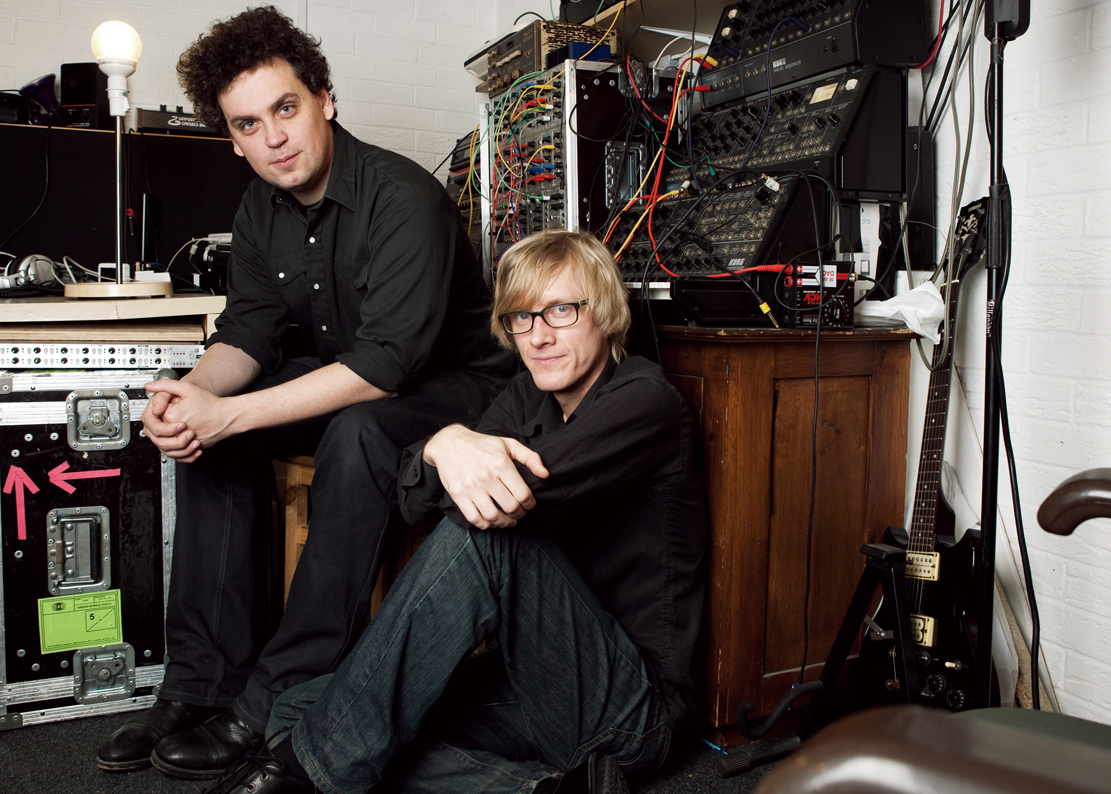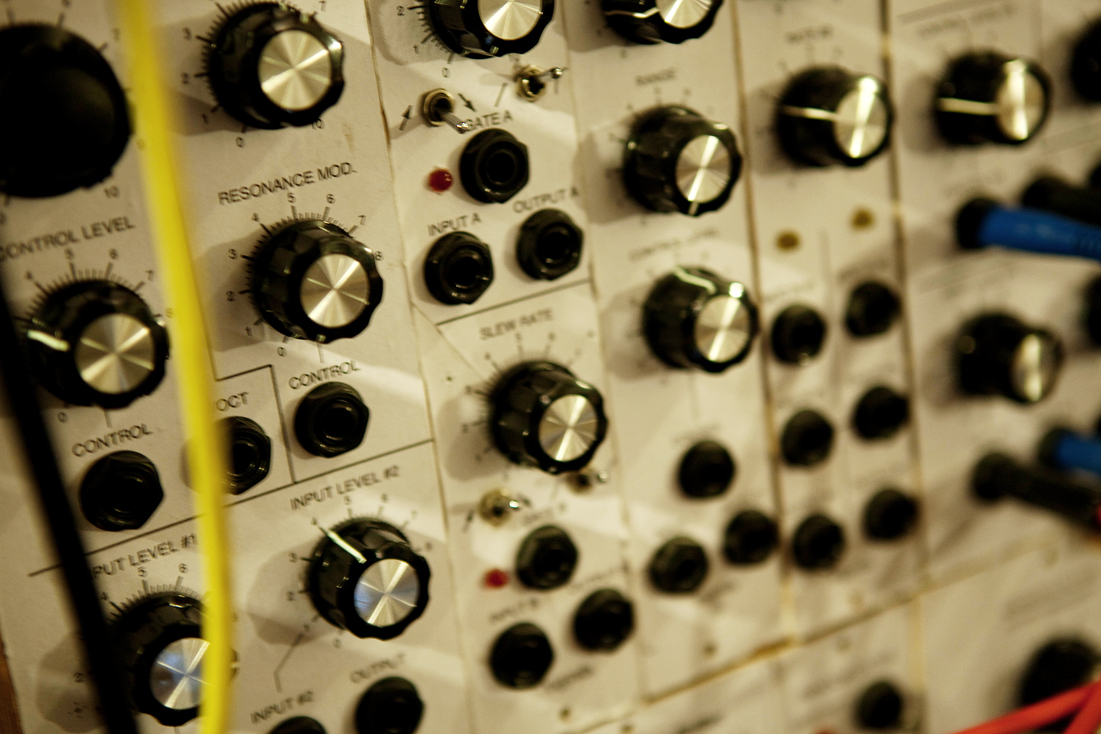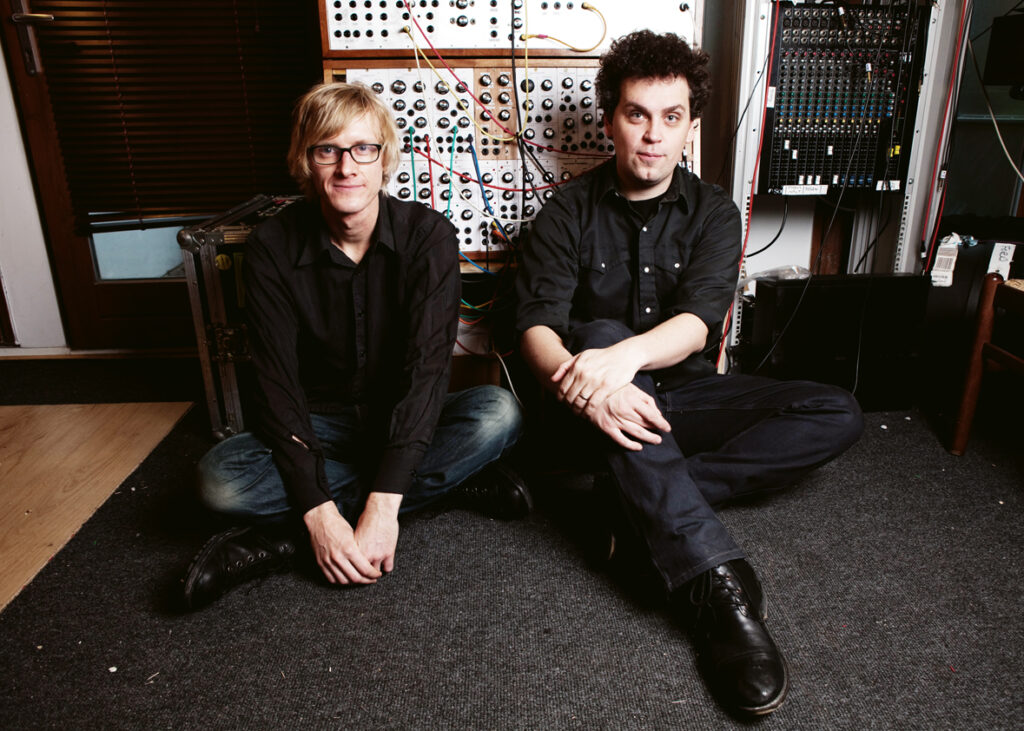To walk into the studio room that SMD (né Simian Mobile Disco; né Simian) have made their base in East London’s The Premises, is to walk into a TARDIS… albeit a TARDIS that is the same size on the inside as it is on the outside. The walls are lined with what they refer to simply as boxes (synthesizers, patch boards, sequencers, drum machines, vocoders and the like) which are all interconnected with snake-like flexes of brightly insulated wire. Jas Shaw, the blond and bespectacled member of the duo, nods respectfully at a large 1970s ARP synthesizer in the corner and says: "That’s pretty much the voice of R2D2 right there." When James Ford turns up he runs a hand through a mop of curls, flicks on switches to power equipment up, while growling to himself: "I’ve been drinking all weekend and now I think I’ve got gout…"
They’ve had the same rehearsal space since they formed SMD as an outlet for their interest in dance music, which wasn’t being fulfilled by their day job as members of folk/indie outfit Simian. Early bangers such as ‘The Count’ (2005) and ‘Hustler’ (2007) released on Kitsune and remix work done for the indie/rock glitterati of the day set them apart from the rest of the pack who would go on to form the backbone of new rave. But during the period when they were cementing their reputations as producers and DJs as well as bona fide pop stars with the albums Attack Decay Sustain Release and Temporary Pleasure, they were, all the while, amassing vintage equipment in this little space.
Their mastery of this equipment as well as their knack for creating a party starting ruckus has become much more apparent on their recent Delicacies series of releases however. Naming all of these acid/electro/techno stompers after various local dishes that they’ve encountered while touring the world, you can see how they’ve hit a new peak level when working with this vintage equipment. The series of 12"s has recently been compiled as an <a href=” http://thequietus.com/articles/05437-compilations-reissues-mixes-and-live-albums-best-of-2010” target=”out”>album which, quite rightly, features very highly on our compilations and reissues of 2010 chart and has been our office party tape of this season.
Freed up from relying on vocals from guest stars this is synth rave porn in excelsis and is an example of two men – if you will forgive the terrible pun – thinking successfully outside of their boxes.
When I listen to Delicacies by Simian Mobile Disco, I automatically think of Dr Who (played by Tom Baker) and Romana (played by Lalla Ward) going round the universe solving crimes in a very gentrified manner.
James Ford: I’m not sure about gentrified.
Jas Shaw: And I’m not sure about Victorian either. We went down that route with Simian and we’ll never go down it again.
JF: I don’t know really… you’ve put a lot more thought into it than we’ve ever done. We literally just made the music we wanted to make at that point to play out as DJs. We’ve been doing a lot of DJing this year and so we just plugged in some boxes and tried to make music we were into… we didn’t solve any crimes. Which is slightly disappointing.
JS: Although there was that one crime we did solve… [trails off enigmatically]

How much of your output stems simply from wanting to make crazy noises using machines?
JF: Quite a lot.
JS: Yeah. Most often the way that we work, is that we start with a bit of gear or a system. Sometimes we’ll have an idea of how a couple of different bits of kit could be put together in an unusual way. And it’s an experiment: let’s just plug that into that into that in a way that we haven’t done before and the sound that comes out suggests melodies. Certain synths or certain ways of playing actually limit you as well. A good example of this is the sequencers we use. If you want to play something like a long melody, then an analogue sequencer isn’t the way forward because you’ve only got a limited amount of steps and it’s very… limiting. But those limitations actually suggest a melody or a form or suggest a song itself. So those kind of limitations and narrowing of options actually becomes the spark for where a tune goes.
How much of Delicacies is made on vintage analogue equipment?
JF: All of it really. We’ve got a computer here which we use as a recording device really but we don’t do any sequencing or anything on it. We’ll edit large chunks on computer but you could probably do the same thing on a 24 track. But everything is generated from all the bits you can see around you. Generally all the sequencers, all the drum machines and all the electronics in here we will record 15-minutes of it… like a performance of it and then fuck about with it. And then edit together the best bits.
How much of it comes from wanting to have unique source material for when you’re DJing?
JS: Probably a fair bit of it. In fact when we first started SMD, we were just making tunes to play out… it was that simple. But particularly after the last album we wanted to go back to that feeling of making a tune and then playing it out at the weekend. You might tweak it a little bit but then it’s out there and it’s a sense of instant gratification that you get from that process and you don’t have to think about it in terms of a larger structure such as an album. It’s just going back to the very basic, fun element of going into the studio and thinking, ‘What’s going to happen?’
JF: The thing about music now being everywhere and very easy to access means that having original bits to play as a DJ is a bigger thing now than it ever has been. Everyone… any bedroom DJ can get hold of any of the newest tunes as quickly as anyone else. I think before there used to be a bit of lag time!
Even your dad’s a DJ now.
JF: Exactly, so we’ve always made bits and pieces, stuff we can mix over the top and drum patterns. In fact we thought recently that it might be more clever to make stuff and don’t release it! Then you’ve definitely got stuff that other people don’t! It’s an odd thought isn’t it?

Is Delicacies a bit like the acid techno version of Anthony Bourdain’s A Cook’s Tour? Have I got it right that all of the tracks are named after particularly bracing local dishes that you’ve encountered while on tour?
JF: To be fair we probably haven’t eaten all the ones that we’ve talked about. It’s just that we got on to an idea… naming instrumental tracks can be a fairly random process and we didn’t want to resort to picking up pieces of gear and looking what’s written on the back of them, which we have done in the past. We just thought it might be nice to have a theme that ties all these releases together. And this just coincided with us getting interested in how delicacies are generally the worst parts of the animal but dressed up to be a really fancy thing. I always remember my granddad saying, ‘Ah, this is the best bit, the parson’s nose.’ And you’re thinking, ‘But it’s a chicken’s arsehole!’ It’s almost like a cultural lie about food. We found it quite interesting so wherever we were we would ask people about food… about what was the most disgusting local dish basically! We got a huge long list of weird and wonderful things and for us it was brilliant because whenever we made a track we just named it after one of them.
JS: The whole kind of thing is interesting about how these dishes have remained local… they’ve just not spread at all. Culturally, music and all other media will go everywhere but not these weird foods. You would think that they would have spread out but even within countries they just exist in tiny pockets.
Like you said before, the homogeneity of culture caused by the internet, makes this kind of food seem even more exotic in a way. There’s no way on earth that a shark’s fin buried under the ground for months so all the ammonia leaches out of it is going to catch on outside of Iceland. Which of these dishes actually have you had?
JF: Not that many actually!
JS: We’ve had aspic, that’s like a clear, jelly made from bones, the kind you get in a pork pie.
JF: We’ve had sweetbread, which of course is the animal’s testicles. We could have named that track Prairie Oysters.
JS: I’ve had skin crackers, which is basically the subcutaneous fat from a cow, deep fat fried… like a beef scratching!
JF: The trouble with this is, that people think you’re really into this exotic food but I’m not really into eating eyeballs and brains and stuff. But I’ve found that now I tend to get presented with them.
JS: The next record is going to be called Seasonal Summer Fruit.
The one after should be called A Fine Selection Of Ales… Is there such a thing as a thousand year old egg?
JS: Well, it’s not 1,000 years old. They wrap eggs and bury them in the ground and when they dig them back up they’ve gone very dark. I’ve not had them but I know people who have. They say it’s not that bad, just a bit slushy and mega-eggy.
JF: That’s what’s fascinating. People eat this stuff all the time but it’s only really weird to you, the outsider.

I was with a friend who is a good DJ and in a couple of bands and I put on Delicacies and straight away he was like, ‘What’s going on here? This is all analogue.’ People can tell can’t they? It’s not that subtle a difference is it?
JF: We never really know if people can tell or not or if they care or not. Not that it really matters if they do or not because it’s just the way that we get enthusiastic to make a tune. We both use laptops when we’re travelling and try and make tunes using soft synths and to all intents and purposes they sound very similar but we can never get anything done that way and never finish a track in that way. And I think it’s because there’s an extra uncontrollable element that analogue equipment gives you because they’re out of tune or you plug things in the wrong way or the physical act of interacting with it means you get something you don’t expect. And it is those things that make you go, ‘Oh! I wasn’t expecting that!’ The bits that are handed down from somewhere else… those are the bits that make us go, ‘We’ll keep that.’ Those are the bits you never get from a computer and I don’t know why.
These lucky accidents or bits of chaotic noise emanating from the machine, how often do they occur?
Both: Literally all the time.
JF: The more complex you make the system, the more likely it is to occur. Because of the chaos theory you can never really predict the outcome.
So it’s the sonic equivalent of video feedback?
JS: Yeah, feedback is a good example. A lot of what happens in things like our ARP is that some of the audio and the control voltages – the things that control the sound – bleed through; it’s just because they’re badly, or not perfectly, made. And you get weird noise, which literally is feedback. Things feed through and back into themselves. You get these definite one off moments. Getting into the idea of hysteresis where you’ve got a system and you can only know its state by looking at all the things that have happened to it previously. So all the little wobbles can build up until you get some kind of lag or delay and, say, the voltage won’t be able to change quite quick enough so there is that weird state of everything feeding back into each other. If it was perfect feedback you’d just have one single tone but because it’s delayed, there is a blurring effect. This usually occurs when you turn a dial and it just doesn’t do what you think it’s going to. All of a sudden it’s doing the opposite thing or something new entirely. You do need a degree of knowledge to programme and patch but it’s good to be able to say, ‘Well that is what I wanted but this accident sounds even better.’
Did you have a Damascene conversion to dance music or has it always been there for you?
JF: We both lived in Manchester in the mid-90s. The Hacienda had closed. In some ways it was the dead end of the acid house boom. There were things going on that we used to go to like Bugged Out. Our link to electronic dance music was WARP and Aphex and then when we got to Manchester I ended up playing with 808 State and through hanging out with Graham [Massey] he introduced me to a lot of weirder electronic music. That period was when we got into it. But weirdly, we then went on a detour and got a band together, Simian, which was more of a folky thing. I guess the thing that joined it together was the fact that the singer Simon was into Autechre.
When you’re working on a tune does it become clear reasonably quickly that this is a Delicacy or this will sound good with Kele Okereke from Bloc Party singing on it?
JF: [laughing] I don’t know if we’ll ever get back to the stage where we’ll have loads of vocalists. We’ve definitely set up Delicacies as something we can continue and do as a side thing. There are always tunes that stick out as that kind of thing. Because we’re starting to work towards a new record now. We’ve literally just started on it and in fact it’s probably what we’ll be doing all this week. I reckon we’ll have a few vocalists but definitely nothing like before. But there’s always the odd tune that sticks out as having a melodic space and either you can fill it with a synth part or with a vocal melody.
And how is the stuff for the new album going?
JF: Good actually! We’ve not spent very long on it but we’re both itching to get back on with it. We always go on detours when we’re making stuff so there’s no point in me telling you what it’s going to end up like but at the minute I reckon it will be a balance between Delicacies and the older stuff. But we’re definitely going to make it more for ourselves than we have done in the past. It’s hard to say when it will be done by because we’ve both got plenty of production stuff on. We’re not in a massive rush to get something out there; we’d just sooner take our time and do something we’re both really pleased with.



